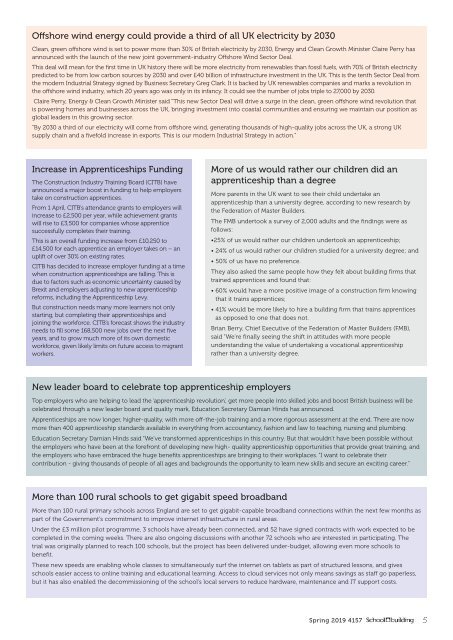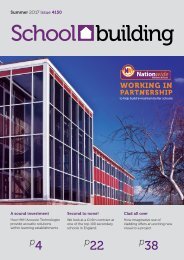School Building Spring 2019
You also want an ePaper? Increase the reach of your titles
YUMPU automatically turns print PDFs into web optimized ePapers that Google loves.
Offshore wind energy could provide a third of all UK electricity by 2030<br />
Clean, green offshore wind is set to power more than 30% of British electricity by 2030, Energy and Clean Growth Minister Claire Perry has<br />
announced with the launch of the new joint government-industry Offshore Wind Sector Deal.<br />
This deal will mean for the first time in UK history there will be more electricity from renewables than fossil fuels, with 70% of British electricity<br />
predicted to be from low carbon sources by 2030 and over £40 billion of infrastructure investment in the UK. This is the tenth Sector Deal from<br />
the modern Industrial Strategy signed by Business Secretary Greg Clark. It is backed by UK renewables companies and marks a revolution in<br />
the offshore wind industry, which 20 years ago was only in its infancy. It could see the number of jobs triple to 27,000 by 2030.<br />
Claire Perry, Energy & Clean Growth Minister said “This new Sector Deal will drive a surge in the clean, green offshore wind revolution that<br />
is powering homes and businesses across the UK, bringing investment into coastal communities and ensuring we maintain our position as<br />
global leaders in this growing sector.<br />
“By 2030 a third of our electricity will come from offshore wind, generating thousands of high-quality jobs across the UK, a strong UK<br />
supply chain and a fivefold increase in exports. This is our modern Industrial Strategy in action.”<br />
Increase in Apprenticeships Funding<br />
The Construction Industry Training Board (CITB) have<br />
announced a major boost in funding to help employers<br />
take on construction apprentices.<br />
From 1 April, CITB’s attendance grants to employers will<br />
increase to £2,500 per year, while achievement grants<br />
will rise to £3,500 for companies whose apprentice<br />
successfully completes their training.<br />
This is an overall funding increase from £10,250 to<br />
£14,500 for each apprentice an employer takes on – an<br />
uplift of over 30% on existing rates.<br />
CITB has decided to increase employer funding at a time<br />
when construction apprenticeships are falling. This is<br />
due to factors such as economic uncertainty caused by<br />
Brexit and employers adjusting to new apprenticeship<br />
reforms, including the Apprenticeship Levy.<br />
But construction needs many more learners not only<br />
starting, but completing their apprenticeships and<br />
joining the workforce. CITB’s forecast shows the industry<br />
needs to fill some 168,500 new jobs over the next five<br />
years, and to grow much more of its own domestic<br />
workforce, given likely limits on future access to migrant<br />
workers.<br />
More of us would rather our children did an<br />
apprenticeship than a degree<br />
More parents in the UK want to see their child undertake an<br />
apprenticeship than a university degree, according to new research by<br />
the Federation of Master Builders.<br />
The FMB undertook a survey of 2,000 adults and the findings were as<br />
follows:<br />
•25% of us would rather our children undertook an apprenticeship;<br />
• 24% of us would rather our children studied for a university degree; and<br />
• 50% of us have no preference.<br />
They also asked the same people how they felt about building firms that<br />
trained apprentices and found that:<br />
• 60% would have a more positive image of a construction firm knowing<br />
that it trains apprentices;<br />
• 41% would be more likely to hire a building firm that trains apprentices<br />
as opposed to one that does not.<br />
Brian Berry, Chief Executive of the Federation of Master Builders (FMB),<br />
said “We’re finally seeing the shift in attitudes with more people<br />
understanding the value of undertaking a vocational apprenticeship<br />
rather than a university degree.<br />
New leader board to celebrate top apprenticeship employers<br />
Top employers who are helping to lead the ‘apprenticeship revolution’, get more people into skilled jobs and boost British business will be<br />
celebrated through a new leader board and quality mark, Education Secretary Damian Hinds has announced.<br />
Apprenticeships are now longer, higher-quality, with more off-the-job training and a more rigorous assessment at the end. There are now<br />
more than 400 apprenticeship standards available in everything from accountancy, fashion and law to teaching, nursing and plumbing.<br />
Education Secretary Damian Hinds said “We’ve transformed apprenticeships in this country. But that wouldn’t have been possible without<br />
the employers who have been at the forefront of developing new high- quality apprenticeship opportunities that provide great training, and<br />
the employers who have embraced the huge benefits apprenticeships are bringing to their workplaces. “I want to celebrate their<br />
contribution - giving thousands of people of all ages and backgrounds the opportunity to learn new skills and secure an exciting career.”<br />
More than 100 rural schools to get gigabit speed broadband<br />
More than 100 rural primary schools across England are set to get gigabit-capable broadband connections within the next few months as<br />
part of the Government’s commitment to improve internet infrastructure in rural areas.<br />
Under the £3 million pilot programme, 3 schools have already been connected, and 52 have signed contracts with work expected to be<br />
completed in the coming weeks. There are also ongoing discussions with another 72 schools who are interested in participating. The<br />
trial was originally planned to reach 100 schools, but the project has been delivered under-budget, allowing even more schools to<br />
benefit.<br />
These new speeds are enabling whole classes to simultaneously surf the internet on tablets as part of structured lessons, and gives<br />
schools easier access to online training and educational learning. Access to cloud services not only means savings as staff go paperless,<br />
but it has also enabled the decommissioning of the school’s local servers to reduce hardware, maintenance and IT support costs.<br />
<strong>Spring</strong> <strong>2019</strong> 4157<br />
5
















